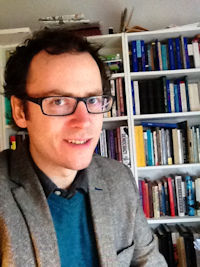Dr Alfred Moore
Senior Lecturer
Visit Dr Alfred Moore's profile on the York Research Database to:
- See a full list of publications
- Browse activities and projects
- Explore connections, collaborators, related work and more
Profile
Biography
Alfred Moore works on political theory, with particular interests in deliberative democracy, social epistemology, politics of expertise and technology and democracy. Until 2017 he was a research fellow at Cambridge University working on the Leverhulme Trust project ‘Conspiracy and Democracy: History, Political theory, Internet’. He has a PhD from the University of Bath, and has taught philosophy at University College Cork (2006-2009), held a European Union Marie Curie Research Fellowship (2009-2012) to work at the University of British Columbia on the project Epistemology and Democracy in Complex Societies, and was a Democracy Fellow at the Ash Center for Democratic Governance and Innovation at Harvard University in 2012. He has published in a wide range of journals, including Political Studies, the Journal of Political Philosophy, Critical Review, Episteme, Economy and Society, and Social Studies of Science, among others.
He has published on the problem of expertise in democratic theory, which was the subject of his recent book, Critical Elitism: Deliberation, Democracy, and the Politics of Expertise (2017, Cambridge University Press). Coming out of the project on expertise he has been working on the themes of transparency, trust, and suspicion in democratic politics. He also has a current interest in the networked public sphere - the ways in which the internet is changing democratic politics - and has recently been part of a project at Cambridge University studying anonymity in online political discourse (see 'research' for more details).
Research
Overview
Alfred’s research to date has focused on the politics of expertise, which he developed during his Marie Curie fellowship and his recent book, Critical Elitism: Deliberation, Democracy, and the Politics of Expertise (CUP, 2017). In this work he brought together critical studies of science and technology and contemporary democratic theory in order to address the question how expert authority can be constructed and maintained in a context of empowered critical contestation. In this context, he has written, among other things, on J.S. Mill, the concept of consensus (see here and here), and deliberative and epistemic democracy.
One of the conclusions of this work was that transparency about the process of construction of expert knowledge for policy processes has the potential to build ‘critical trust.’ His more recent - and ongoing - research asks about the limits of this claim, and addresses more generally the themes of trust, transparency, and suspicion of democracy. In this context he has written on Hayek’s social and political theory, edited a special issue on the theme of conspiracy and democracy, and has written on the problem of democratic distrust (forthcoming in an edited volume with OUP).
He also has an interest in the networked public sphere, and the ways in which the internet might be changing democratic politics. He has been involved in an empirical research project on online political discourse (see here for our contribution to the ACM Web Science conference 2015 at Oxford), and has recently published on the concept of anonymity and its relation to theories of deliberative democracy (see a pre-publication version of the paper here).
For a detailed list of publications and some current work in progress, please see my page on academia.edu.
Supervision
PhD Supervision:
- Kate Long, Common ground for a common future? Exploring dynamics of hybridity within environmental democracy
- Sophie Cogan, Just Hope? Exploring Energy Justice and Climate Ethics in relation to Nuclear Fusion
Dr Alfred Moore welcomes PhD applications in the following areas:
- Politics of expertise, science, and technology
Political Theory - Democratic Theory
- Deliberative Democracy
Teaching
Undergraduate
Alfred is currently teaching the undergraduate modules Introduction to Political Theory and Contemporary Political Philosophy.
Contact details
Dr Alfred Moore
Department of Politics and International Relations
University of York
YORK
YO10 5DD


